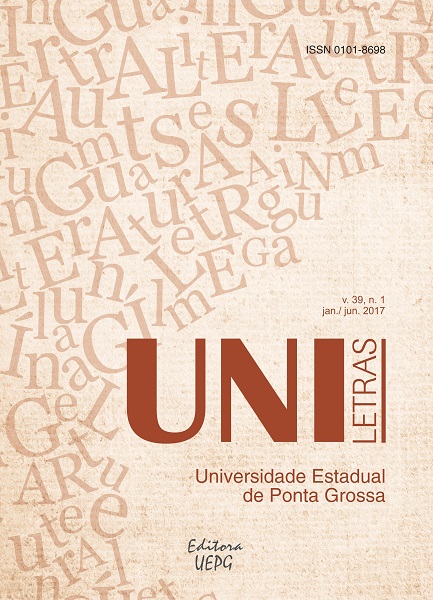A INTERTEXTUALIDADE E A PARÓDIA NO NOVO ROMANCE HISTÓRICO BRASILEIRO – UMA LEITURA DOS ROMANCES A REPÚBLICA DOS BUGRES E CONSPIRAÇÃO BARROCA, DE RUY REIS TAPIOCA
DOI:
https://doi.org/10.5212/uniletras.v39i1.10023Palavras-chave:
Intertextualidade, paródia, Novo Romance Histórico brasileiro, A República dos Bugres e Conspiração Barroca, de Ruy Reis Tapioca.Resumo
É muito comum ouvirmos dizer que as palavras, assim como a própria linguagem literária, constituem materiais permanentes de vários romancistas. Não é por acaso que a natureza do romance histórico, partindo para uma representação da realidade, é recriar episódios do passado, sejam remotos ou não, obsoletos ou esquecidos na própria atualidade. Assim é marca recorrente do Novo Romance Histórico a utilização de estratégias de escrita que recorram à paródia e à intertextualidade. O presente artigo investiga como são ofertados os tratamentos intertextual e paródico em relação às questões estéticas nos romances históricos A República dos Bugres e Conspiração Barroca, de Ruy Reis Tapioca. Como ferramental teórico, cada qual ao seu modo, temos: Hutcheon (1985); Dentith (2000); Wesseling (1991); Saymoault (2008), dentre outros importantes. Objetivamos deixar como contributo, algumas considerações a respeito das estratégias textuais da intertextualidade e da paródia que alguns romancistas estão utilizando nos últimos tempos a respeito do novo formato de romance histórico.Downloads
Downloads
Publicado
Edição
Seção
Licença
Autores que publicam nesta revista concordam com os seguintes termos:
a) Os autores mantém os direitos autorais e concedem à revista o direito de primeira publicação, com o trabalho simultaneamente licenciado sob a Creative Commons Attribution License que permite o compartilhamento do trabalho com reconhecimento da sua autoria e publicação inicial nesta revista.
b) Esta revista oferece acesso livre imediato ao seu conteúdo, seguindo o princípio de que disponibilizar gratuitamente o conhecimento científico ao público proporciona maior democratização mundial do conhecimento. Para maiores informações sobre esta abordagem, visite Public Knowledge Project, projeto que desenvolveu este sistema para melhorar a qualidade acadêmica e pública da pesquisa, distribuindo o OJS assim como outros softwares de apoio ao sistema de publicação de acesso público a fontes acadêmicas. Os nomes e endereços de e-mail neste site serão usados exclusivamente para os propósitos da revista, não estando disponíveis para outros fins.

This work is licensed under a Creative Commons Attribution 4.0 International License.





